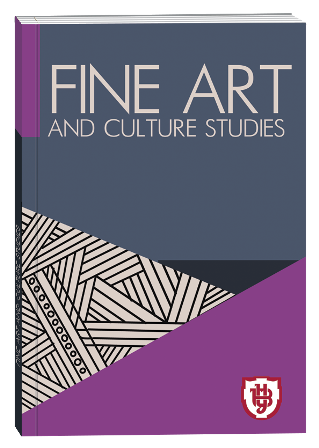UKRAINIAN FOLKLORE PSALM АS А REPRESENTATIVE OF THE NATIONAL WORLDVIEW
DOI:
https://doi.org/10.32782/facs-2022-6-3Keywords:
Ukrainian musical culture, spiritual tradition, worldview, genre, folk psalm, continuity, musical logo.Abstract
The relevance of the research problem is directly related to the situation in Ukraine in 2022, which in a new round of historical progress raise the issue of preserving the national identity. In modern science, studies of ontological principles of the national culture and iconic artistic phenomena are in great demand. Under consideration is the current state of the scientific reflection on the Ukrainian folklore psalm, its historical reception. The purpose of the research paper is the experience of analyzing the folk psalm as a representative of the Ukrainian worldview (the spiritual dimension of the national musical culture). The selected issues are aimed at highlighting the nourishing power of the genetic memory of the national culture. The research methodology is based on a combination of historical-genetic, genre and stylistic scientific approaches. The scientific novelty of the obtained results is related to the justification of the genre analysis methodology as a component of the general context of the Ukrainian worldview. The phylogenesis of the folklore psalm in the space of sacred songwriting (psalm, spiritual poem) is considered. The relatedness of the folk psalm to the psalm genre is proved. The ontological distance between secular (folk psalm) and church (psalm) types of culture is delimited. The research findings outline the proposed genre typology of the folk psalm genre in the sequence of structural and stylistic features (solo and polyphonic types). The emphasis is made on mental signs of the genre which confirm the ontological nature of thinking of the Ukrainian people as an integral «spiritual unit» (O. Potebnya): religiosity, cordocentrism, uniqueness of the worldview (ecos-ethos-ethnos). The paper reveals the essence of the folk psalm as an ethnopsychological phenomenon which conceptualizes the historicism of ideas about the Ukrainian worldview in the modern globalized world.
References
Богданова О. Лірницька традиція в контексті української духовної культури : автореф. дис. … канд. мистецтвознавства: 17.00.03. Київ, 2002, 20 с.
Богданова О. Унікальні записи з репертуару українського традиційного лірництва. Демуцький П. Ліра і її мотиви. Додатки. Біографічні матеріали / упоряд., покажч. О. О. Савчук. Харків, 2012. С. 9–17.
Герасимова-Персидська О. Псалтир у музичній культурі України ХVI–XVII ст. Науковий вісник НМАУ імені П. І. Чайковського. Музика і Біблія : зб. наук. праць за матеріалами міжнар. наукової конф. Київ, 1999, Вип. 4. С. 83–89.
Зосім О. Л. Східнослов’янська духовна пісня: сакральний вимір : монографія. Київ : НАКККіМ, 2017. 328 с.
Кафарський І., Савчук Б. Етнологія. Київ : Центр навчальної літератури, 2006, 432 с.
Козаренко О. Феномен української національної музичної мови. Львів : НТШ, 2000. 285 с.
Літвінова С. Псалом як словесно-музичний феномен в історико-культурному контексті (перше тисячоліття). Науковий вісник НМАУ імені П. І. Чайковського. Виконавське музикознавство : зб. ст. Київ, 2007. Вип. 69. Кн. 13. С. 151–159.
Медведик Ю. Ad Fontes: з історії української музики XVIІ – початку XX ст. : вибрані статті, матеріали, рецензії. Львів : ЛНУ ім. Івана Франка, 2015. 618 с.
Потебня А. А. Мысль и язык. Xарьков : Тип. Дарре, 1892, 228 с.
Романюк І. «Картина світу» в системі категорій аналізу музики (на прикладі української музичної культури) : автореф. дис. ... канд. мистецтвознав. : 17.00.03 ; Харк. держ. ун-т мистецтв ім. І.П.Котляревського. Харків, 2009. 17 с.
Ясіновський Ю. Старозавітні тексти в українській сакральній монодії. Науковий вісник НМАУ імені П. І. Чайковського. Музика і Біблія : зб. наук. праць за матеріалами міжнар. наукової конф. Київ, 1999. Вип. 4. С. 66–72.







